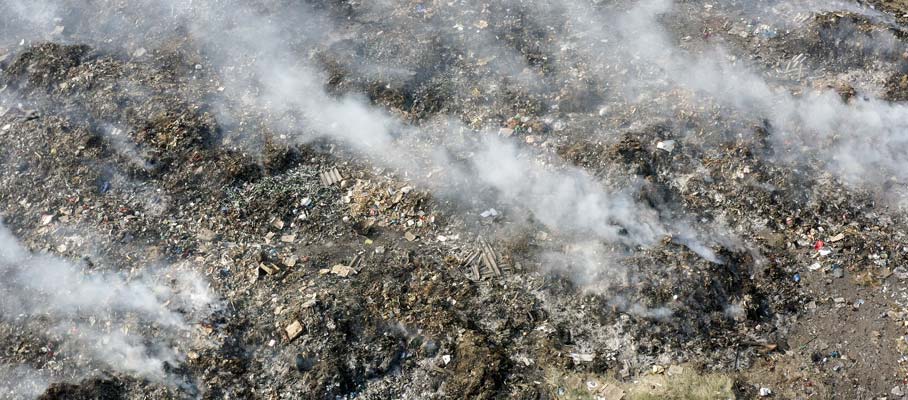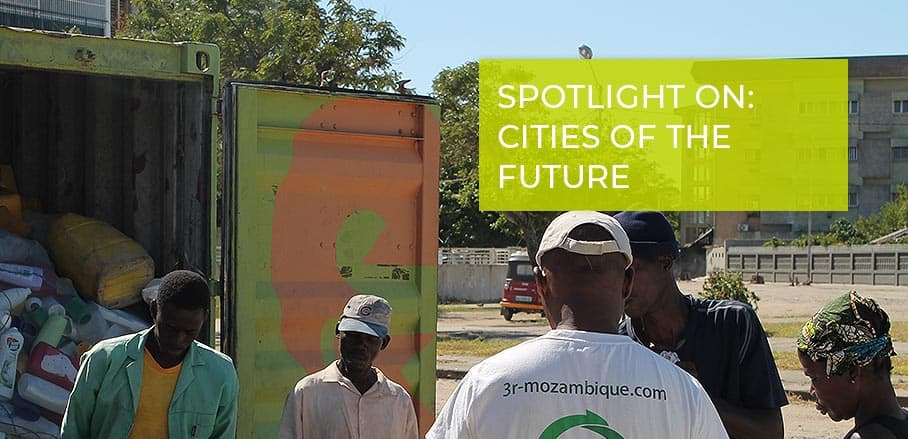To Build An Urban Future, Dare Looking At The Basics
The future of our cities is circular, argues Maíra Valladares from 3R – Reduzir, Reusar e Reciclar, a recycling company aiming to circularise Mozambican cities’ waste management.
As attractive as it can be to dream about high-tech processing plants, Internet of Things (IoT) devices, and smart sensors, promoting systemic change in Mozambique’s waste sector invites us to move forward with, let’s say, a more down-to-earth approach. We are maintaining the vision and passion for a circular future, including regenerative design and innovative methods – but first, let’s tackle a few challenges on the ground.
Overall, it is estimated that Mozambique produces 4,2 million tons of waste per year and that 98 per cent of it ends up in open air dumps, causing greenhouse gas emissions and significant health threats to urban populations. In many municipalities, urban population growth combined with high costs of waste collection and treatment exerts pressure on municipal budgets. Considering Mozambique’s prevalence of extreme poverty, increased occurrence of extreme weather events (tropical cyclones, drought, extreme rain), and economic context, a challenging picture emerges.

Dumpside in Beira, Mozambique ©Robert Weijs
So where to start building a circular future? By strengthening the basics, by making sure a solid foundation is in place which is strong enough to support the transition towards a circular economy, and by all the time engaging both formal and informal stakeholders.
Strengthen the Legal Framework
In December 2017, in a bold movement, the Mozambican Government approved its Extended Producer and Importer Responsibility on Packaging (Decree 79/2017), which effectively extends the responsibility of producers and importers beyond the factory gates and creates economic incentives to increase collection, re-use and recycling.
One of the key elements is the introduction of an Environmental Tax on packaging, which will be charged to producers and importers of packing material. Part of the proceeds from the Environmental Tax would contribute to a fund, dedicated to support investments in sustainable waste management systems and infrastructure, as well as support capacity building and awareness raising.
Build Local Treatment Infrastructure
Currently there is almost no waste treatment infrastructure in Mozambique. The country has only one industrial landfill, a few very small and fragile composting initiatives, and a group of plastic manufacturers of pipes, basins and buckets that buy very specific types of hard plastics to add to their production process. This context reinforces a culture of “collecting and dumping” and the strong dependence of recycling value chains on international markets, as most recyclables/materials need to be exported to receive proper treatment.
Treating and transforming waste locally is the starting point towards sustainability and the circular economy. This initial transformation would accelerate the development of a much-needed local industry, create jobs, stimulate the flourishment of local value chains, and put potentially cheaper products on a national market that currently mainly depends on imports.
Secondly it would reduce the dependency of local recycling business on external trade with other countries. This is particularly important as regulations on the transboundary of waste are becoming more restrictive and purchase prices are extremely volatile. These aspects have intensified during the COVID pandemic.
With regards to infrastructure development, the following should be taken into consideration: the need for innovative financing models and credit lines tailored to the Mozambican waste sector; the volumes of waste available; the type of waste available, the poor support infrastructure (unstable power system, poor access roads) in many parts of the country, the challenges related to equipment maintenance and spare parts.
In this context, an initiative that considers all the constraints presented above and has the ability to reshape the sector, is the new Programme for Sustainable Waste Management in Mozambique – ValoRe. It is led by the Ministry of Land and Environment (MTA) and aims at promoting investment into Integrated Waste Management Infrastructure (sanitary landfills, material recovery facility, and composting centres) in at least ten Municipalities.
Each infrastructure project will be developed under a Public Private Partnership, and the government expects to provide a partial investment grant as well as a results-based subsidy during the operation phase. In addition, the programme expects to attract international climate finance, receive financial support from national resources, and benefit from the environmental tax on packaging when it becomes operational.
Change the Mindset
Recognising waste as a resource, and its value as such, is a fundamental part of the puzzle. However, it is also important to recognise that waste collection and treatment is a service that has a cost associated to it, and the service provider needs to be compensated for its service.
While some recyclables do have a market value, most waste value chains remain under development or extremely fragile in Mozambique. So along with redesign of products, reduction of consumption, and increasing reuse, there should also be awareness about the extended producer responsibility, segregation at source, and the need to pay for the services that ensure that the material will reach the appropriate treatment destination.
Include, Formalise, and Provide Decent Working
In a country with almost no selective collection or take-back schemes, waste pickers play an important role as they are responsible for collecting and making sure most of recyclables reach a final destination outside the dumpsites. However, they continue to operate in an informal environment where they are susceptible to intermediaries, there is lack of clarity on prices, and poor working conditions.
It is about time the waste management plans and strategies, as well as tax authorities, take this group into consideration and create the conditions to include and empower these workers.
At 3R – Reduzir, Reusar e Reciclar, a waste management and recycling company that has been actively working to transform the sector since 2016, we can clearly say that a circular future in Mozambique is much closer and that the window of opportunity for business and financiers is within grasp.
But will the actors in the terrain be able to create the necessary collaborative environment to grab it? Connecting all these dots in a speedy pace will be determinant to build the future of waste management and the Mozambican cities we want to see.
- To Build An Urban Future, Dare Looking At The Basics - 19. August 2021
